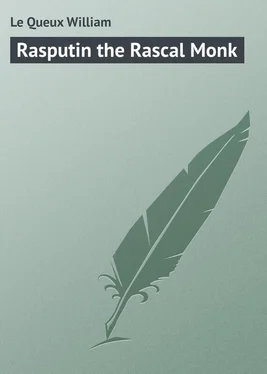William Le Queux - Rasputin the Rascal Monk
Здесь есть возможность читать онлайн «William Le Queux - Rasputin the Rascal Monk» — ознакомительный отрывок электронной книги совершенно бесплатно, а после прочтения отрывка купить полную версию. В некоторых случаях можно слушать аудио, скачать через торрент в формате fb2 и присутствует краткое содержание. Жанр: foreign_language, foreign_prose, на английском языке. Описание произведения, (предисловие) а так же отзывы посетителей доступны на портале библиотеки ЛибКат.
- Название:Rasputin the Rascal Monk
- Автор:
- Жанр:
- Год:неизвестен
- ISBN:нет данных
- Рейтинг книги:3 / 5. Голосов: 1
-
Избранное:Добавить в избранное
- Отзывы:
-
Ваша оценка:
- 60
- 1
- 2
- 3
- 4
- 5
Rasputin the Rascal Monk: краткое содержание, описание и аннотация
Предлагаем к чтению аннотацию, описание, краткое содержание или предисловие (зависит от того, что написал сам автор книги «Rasputin the Rascal Monk»). Если вы не нашли необходимую информацию о книге — напишите в комментариях, мы постараемся отыскать её.
Rasputin the Rascal Monk — читать онлайн ознакомительный отрывок
Ниже представлен текст книги, разбитый по страницам. Система сохранения места последней прочитанной страницы, позволяет с удобством читать онлайн бесплатно книгу «Rasputin the Rascal Monk», без необходимости каждый раз заново искать на чём Вы остановились. Поставьте закладку, и сможете в любой момент перейти на страницу, на которой закончили чтение.
Интервал:
Закладка:
His personal magnetism is indisputable. I can personally vouch for that. On the occasion when I met him in that grey cold repellent village on the Arctic shore, I myself felt that there was something strangely indescribable, something entirely uncanny about the fellow. Those grey eyes were such as I had never before seen in all my long cosmopolitan experience. In those moments when we had exchanged greetings and bowed to each other he seemed to hold me beneath a weird curious spell. He was demon rather than man. Therefore I can quite conceive that the ordinary Russian woman of any class would easily succumb to his blasphemous advances and his assertions that he was possessed of a divinity as the deliverer of Russia. Within the Russian soul, two centuries behind the times, of to-day, mysticism is still innate, and the mock-monk had already proved up to the hilt to his own complete satisfaction that, by pretending to fast, yet having a good square meal in secret; by pretending to make pilgrimages – but really throwing off his monkish “habits” and as a gay man about town taking a joy-ride in a motor car – and by crossing himself continuously and bowing low before every ikon at which he secretly sneered, he could gull the average woman whether she wore pearls or tended the pigs.
Rasputin, a low-born immoral brute, by reason of the discovery of his own hypnotic powers, treated womenkind with the most supreme and utter contempt, and it seems that while clearly masquerading beneath that cloak of extreme piety and aided by his gardener-friend, the Bishop Teofan – a fellow-adventurer from Pokrovsky – he resolved after his Moscow adventure, to make a bold bid for further power.
Most men in such circumstances as these would have been both cowed and careful. Against him he had Stolypin, at that moment one of the most powerful men in the Empire, as well as the Grand Dukes Nicholas and Dmitri Pavlovitch, M. Gutchkoff – a bearded man in gold pince-nez with whom I had had before the war many interesting chats in Paris and in Petrograd, and who subsequently became Minister of War and Marine – M. Miliukoff, the whole-hearted Deputy for Petrograd in the Duma, and what was far more serious, he had fifty or more wildly irate husbands and fathers, all eager and anxious to bring about the scoundrel’s downfall.
Traps were laid for him, but, with the amazing cunning of the erotic lunatic, he eluded them all. Back in Petrograd, in the salons of the highest in the Empire, he lived in luxury, with cars always at his disposal. The “Holy Father” who had his own suite in the private apartments of the Imperial family was welcomed everywhere he deigned to go. His creature, Ilya Kousmitch, warned him of the pitfalls that were being set. Even his dissolute crony the Bishop Teofan – whom, through the Empress, he had himself created – grew grave. But the “Saint” merely bit his dirty finger nails, as is the habit of the Siberian peasant, and replied:
“Gregory Novikh has been sent to Russia by Divine Providence. He has no fear!”
Soon after his narrow escape in Moscow he received a letter from the father of the two young girls who had so completely fallen beneath his pious blandishments – a letter in which the angry father declared that he would shoot him at sight.
To that letter Rasputin, with the overbearing impudence of one who smoked and spat upon the carpet actually in the Empress’s presence, and, who had the audacity to prompt the Tsar in making his appointments and dealing with the affairs of State, replied by telegram – a message still upon record – sent over the private wire from the Winter Palace:
“Shoot – and God will reward your daughters bountifully. – Gregory.”
Though Rasputin presented a remarkably calm exterior, he no doubt, was much perturbed by that threat. A single false step would certainly land him either in oblivion or in prison. But criminal lunatics of his sort are notoriously clever and astute. “Jack-the-Ripper” was of exactly similar type, and he defied the whole detective police of the world.
The Secret Police of Russia, the wiles of which have been so vaunted by the modern novelist, were as childish idiots when their brains became pitted against those of the uncouth Siberian peasant, who, calling himself a “saint,” could induce every silly woman to follow his immoral directions.
Just then the Empress, whose shallow impressionable mind led her to adopt any new craze, and to seek any new sensation, met a person in whom she indiscreetly placed her trust – a treacherous, long-bearded political adventurer, named Boris Stürmer. This man was a boon companion of the “Saint” in his debaucheries in the midnight wilds of Petrograd, for Rasputin, when believed to be absent for a week of prayer and self-denial, usually bathed himself, and wearing a well-cut evening-suit plunged into the gay midnight life at the Old Donon, the Belle Vue, or the Bouffes, on the Fontanka. Thus Boris Stürmer, a strong pro-German who had many family connections with the enemy – and the bosom friend of Rasputin – actually became Prime Minister of Russia, such being the mock-monk’s astounding influence over the Imperial Autocrat, whose wife and family were, alas! as but clay within his filthy hands.
This latest triumph proved conclusively to Rasputin that his power was as great as that of the Emperor – indeed, to certain of his intimates he used laughingly to declare himself to be the uncrowned Tsar!
“I live in the Palace,” he would declare. “The Empress does my bidding; her daughters are as my children; the Court bows to me; Nikki only smiles as an idiot – therefore, am I not the real Emperor of Russia?”
Discovering his own overwhelming influence this sinister favourite of both Tsar and Tsaritza suddenly resolved upon a further move, the cleverness of which was indeed well within keeping with his marvellously astute reasoning. He decided not to be dependent upon the charity of the Imperial pair, whom the Bishop Teofan had one day declared kept him in the Winter Palace as a tame saint. His friend’s taunt stung him to the quick.
In consequence, he took a luxurious house in the Gorokhovaya, just beyond the Moyka, and close to the Palace, and while still retaining his apartments in the Palace, he lived mostly in his new abode, where in future he announced that the bi-weekly meeting of his disciples for prayer and consolation would be held.
Like wildfire the decision of the “wonder-worker” ran through the salons of Society. There was now a chance for others to enter the cult of the “Sister-disciples,” and to become as one flesh with the Saint, and to be cured by Divine agency of any ill.
Hundreds of society women were frantically anxious to enter this new sisterhood.
His house was an expensive one, but only a few of the rooms were well furnished. The dining-room on the ground floor was a large rather bare-looking place, with cheap chairs set round and equally cheap tables of polished walnut. On the walls were portraits of the Tsar, the Tsaritza and himself. Upstairs was his study, a large luxurious apartment, and from it led the bedroom of the “holy” man, which even eclipsed the study in luxury. To this house the smart band of society converts who called themselves the “Sister-disciples” went regularly twice each week to hear the “miracle-worker” descant upon the beauties of his new religion.
Among the members of this degenerate group were: – the pretty fluffy-haired little Princess Boyarski, Madame Pistolcohrse, sister of Madame Vyrubova, a certain Countess Yepantchine, whose splendid house was in the Sergiyevskaya, the most fashionable quarter without equal in Petrograd, as well as the Grand Duchess Olga, daughter of the Tsaritza, and many others.
Though the blasphemous discourses were delivered and the disgusting secret rites practised twice each week at Rasputin’s house, as well as also twice weekly in secret at Tsarskoe-Selo, many women seeking knowledge of the new religion – after having fallen beneath the spell of the mock-saint’s eyes – went to the monk alone by appointment, and there had what the blackguard termed “private converse” with him in his upstairs study adjoining his luxurious sleeping apartment.
Читать дальшеИнтервал:
Закладка:
Похожие книги на «Rasputin the Rascal Monk»
Представляем Вашему вниманию похожие книги на «Rasputin the Rascal Monk» списком для выбора. Мы отобрали схожую по названию и смыслу литературу в надежде предоставить читателям больше вариантов отыскать новые, интересные, ещё непрочитанные произведения.
Обсуждение, отзывы о книге «Rasputin the Rascal Monk» и просто собственные мнения читателей. Оставьте ваши комментарии, напишите, что Вы думаете о произведении, его смысле или главных героях. Укажите что конкретно понравилось, а что нет, и почему Вы так считаете.












